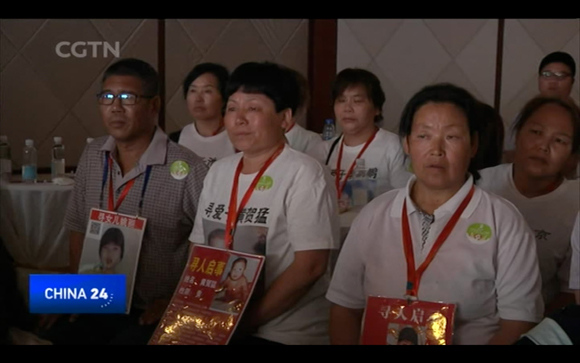
(Photo/CGTN)
A non-government organization in China has launched what's been called a Chinese version of the "Amber Alert" system, in a bid to help find children abducted by human traffickers. Child abduction cases have skyrocketed in recent years, as authorities adopt various measures in a bid to tackle such crimes.
Middle-aged mother Du Shufeng has been searching for her lost son, Hemeng, for 20 years. She and her husband live in a village in Xingtai, Hebei Province, but the woman has traveled across China in search of her son.
"I was buying vegetables, and left my three-year-old son playing outside the store. I came back only a few minutes later, and couldn't find him again. He was the only son of our family. I can't face the family anymore." Du told CGTN.
Before they lost their son, Du and her husband had moved to a nearby city and started a small business. But over the past twenty years, the family returned to poverty, selling almost everything to cover Du's travel costs as she looked for her son.
"I met many other parents on my way. They lost their children, too. They are all like us. Everyone keeps searching, no matter the cost," said Du.
Du seizes every possible chance to put up posters of her son's photo and her contact information, hoping there could be strangers who happen to see her son. She and some other parents traveled all the way to Beijing on Saturday, with Beijing-based NGO Shentuxia covering some of their travel costs with public donations.
But Shentuxia has a much bigger agenda than just helping these parents travel around the country. On June 3, Shentuxia launched a mobile application that sends messages to users in surrounding areas instantly after a child has been reported lost by parents.

That system started in the US twenty years ago as the "America's Missing: Broadcast Emergency Response" system. Despite criticism over false alarms, the system says 97 percent of lost children reported through Amber Alert are successfully recovered, compared to a 0.1 percent success rate in China, according to media estimates.
"Chinese police now stress too much on confirming whether the report is true. But in each minute, the human trafficker could bring the child one kilometer further away. After hours spent fact-checking, the child could be in another city" said Li An, founder of Shentuxia.
With no concrete clues to guide Du's search, how does she decide where to look next after 20 years? She told CGTN she seeks directions from fortune tellers, and travels to whichever city they tell her to go to.
"I must find him. If I can't, I'll keep searching for the rest of my life. I only feel like a mom when I'm on the road," she said.
As Du continues to do everything she can to find her son, Shentuxia hopes its alert system can help the victims of tomorrow, and avoid the lifetime of heartbreak that a missing child can leave behind.


















































